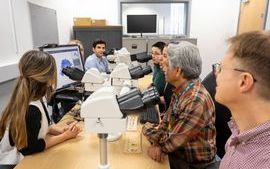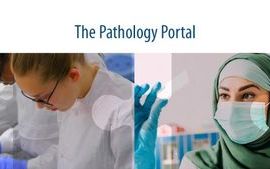- Published:
- 22 April 2025
- Author:
- Dr Erin Whyte
- Read time:
- 4 Mins
The challenges facing autopsy pathology are well known, with a consultant workforce shortage, poor financial remuneration and difficulties balancing autopsy commitments alongside NHS work. As well as the obvious impact on service provision, this climate is having a significant impact on training. Under the UK curriculum, trainees are expected to perform a minimum of 20 adult post-mortem examinations annually for the first 2 years of training. Trainees hoping to progress to higher training and sit the Certificate of Higher Autopsy Training (CHAT) examination are advised to have performed at least 60.
Prompted by many applicants for the position of histopathology trainee representative to the RCPath Death Investigation Committee (DIC), a trainee offshoot group was established. At its inaugural meeting, it was decided that the group’s first action would be to commission a questionnaire of trainees across the UK to get a snapshot of autopsy training.
Nearly 200 responses were received, with representation from every training region in the UK, across the training grades. 43% of respondents were intending to continue autopsy training, 24% were undecided and 34% did not intend to continue (figures rounded). The quality of local training was an important factor in this decision for 70% of trainees.
The reasons stated for not wanting to continue training were multifactorial. For many respondents, it was as simple as not personally enjoying the work, but a wider analysis raised some common themes that should be addressed to encourage continued training and, ultimately, participation in the consultant workforce.
Firstly, the issues facing consultants have not gone unnoticed by trainees. Consultants who are already struggling to balance their autopsy and surgical pathology commitments are less likely to be able to provide in-depth supervision and training. The role of the consultant autopsy pathologist was seen by a significant portion of respondents to be unappealing. As one respondent put it, “All the pathologists I have seen who continue them seem very overworked and undercompensated for the work they do with the coroner”. In the words of another respondent, autopsy training “[is] basically an uphill battle for a qualification with very little benefit other than own professional reward; [it’s] just a lot of additional unnecessary stress”.
Secondly, there is significant regional variation with regards to how much teaching trainees receive and how easy it is (or not) to gain exposure to cases, to meet both curriculum and CHAT case numbers. Many trainees are having to organise placements at a significant distance from their local workplace, with 51% travelling for over an hour (and 16% having to travel over 2 hours). This travel time makes it harder for trainees to juggle autopsy training alongside their surgical pathology commitments and maintain a work–life balance (particularly highlighted by trainees who have caring responsibilities). A respondent said, “I came into pathology wanting to do post mortems but it has been really hard to get exposure. This is factoring into continuing autopsy, because the difficulty in organising it makes me wary of the next few years.”
Despite trainees clearly taking a proactive role in pursuing educational opportunities, 41% reported difficulties in meeting the requirements needed to progress at annual review of competency progression (ARCP). While overall 64% were satisfied with their local training, this satisfaction varied regionally. Many trainees highlighted variation in regional teaching, exposure to ancillary autopsy investigations such as histology and radiology, and support in preparation for the CHAT examination. While 79% of trainees who had sat the exam felt local training was adequate for preparation, 81% felt the resources provided by the College were inadequate.
The responses have been discussed within the trainee group and recommendations developed. It is acknowledged that these issues are part of wider systemic problems in histopathology in the UK and that there are no quick fixes. The group is, however, optimistic that there are achievable actions that could be attempted.
Firstly, College resources (e.g. the Pathology Portal) should be utilised to make key resources available to all trainees. This includes information on the CHAT examination and case studies to level the geographical playing field for trainees who do not have routine exposure to radiology and histology. National training events could also be explored.
Secondly, this data should be used to support wider College work regarding the workforce challenges, since without a steady progression of trainees the situation is unlikely to improve.
Thirdly, there needs to be greater central oversight and support from training schools for trainees who are having difficulties meeting curriculum requirements. It should be an expectation that access to educational opportunities is not reliant on hospital allocation or the ability to travel and/or take study leave, particularly when autopsy pathology remains part of the core curriculum.
The survey results have been taken on board by the Committee, hoping to see the results leveraged into positive change for trainees. Read more on this from Dr Esther Youd, Chair of the DIC, in Autopsy training survey – reflections from the Death Investigation Committee.
Read next
Overcoming challenges in pathology training
22 April 2025
Learning opportunities through the Pathology Portal
22 April 2025




